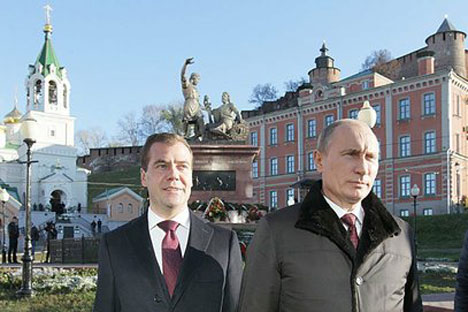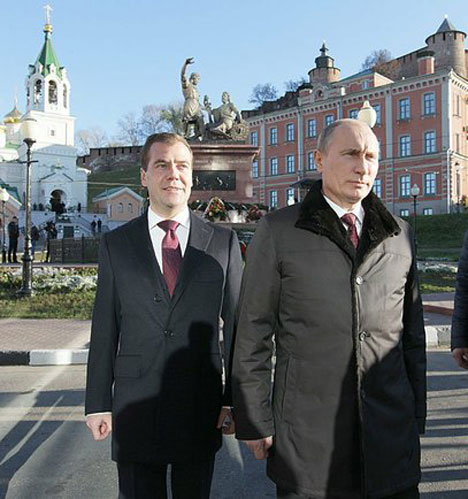Putin, Medvedev exchange posts, but not judo with yoga


Russian President Vladimir Putin (right) and Prime Minister Dmitry Medvedev may “be of the same blood” with two “equal souls” in “different bodies.” Source: Kremlin.ru
If one goes by the precept of irredeemable Indian “Karmic account” philosophy, Russian President Vladimir Putin and Prime Minister Dmitry Medvedev may “be of the same blood” with two “equal souls” in “different bodies.” However, the two leaders have an inescapable bond, calling for them to settle the debts of this “account,” which may have been accumulated from previous births.
At least, it appears so if you keep in view how the two leaders have been closely working in “tandem” for a number of years, exchanging their posts of country’s President and Prime Minister, following the letter and spirit of the Russian Constitution.
Medvedev, who was then Russian President after exchanging his post of Prime Minister with Putin, had said in September 2009 that he had a “lot in common with Putin” and that the popular portrayal of him and Putin as a “young liberal lawyer” and a KGB “spy” was incorrect as they both have a “lot in common in reality.”
“That is why it is wrong when we are portrayed in different colours with one as a 'young liberal lawyer' and the other as a 'spy,' because in reality we have the same perception of many things in life,” Medvedev had told Swiss journalists ahead of his visit to Switzerland, stressing their same educational background majoring in law and graduating from the same Leningrad State University.
Although Putin and Medvedev do share the “same blood group,” and the “same political outlook,” coming from the same hometown of St Petersburg, they have not been able, so far, to share and exchange in practice their favourite pastime Judo and Yoga, reflecting their perception of two main personality traits, with one going after pushing up his “macho” image and the other opting for a “liberal” image.
Medvedev,47, who has himself embraced social media and is an avid user of micro-blog site Twitter, is considered to be more liberal and Western-leaning than Putin, who recently celebrated his 60th birth-anniversary.
When Putin came to power in 2000, martial arts centres started mushrooming across the country. Putin, a Judo Black Belt who is known among his fellow Judo club members for his “haraigoshi” (wicked sweeping leg throw), began studying Judo at 14. In 2007, Putin and Yasuhiro Yamashita, a world Judo champion from Japan, made an instructional video together.
Putin made the Judo increasingly popular in the country and Judo competitions and documentaries continue to be frequently shown on TV channels.
It may be recalled that Russia’s First President Boris Yeltsin famously loved tennis and under his rule created a fashion for tennis among the high Kremlin officials who were then his close allies. Yeltsin’s successor Putin reinforced his “macho” image with a Judo Black Belt and even a Judo text book.
Medvedev who was elected Russia’s President in March 2008, after swapping his post of Prime Minister with Putin’s presidency, started popularising Yoga by publicly talking about his pastime and its benefits. Until then he had kept his enthusiasm for Yoga under wraps. That immediately led to the media speculation that Yoga would become a national pastime, as tennis under Yeltsin and Judo under Putin’s rule.
Shortly after his election as Russia’s President, Medvedev publicly admitted that he had joined the thousands of Russians eager to learn the ancient Indian art of Yoga. “Little by little, I am mastering Yoga,” he said in an interview to the Russian weekly magazine, adding Yoga helped him relax from the stress of work.
Medvedev, in particular, likes to practice “shirshasana” (standing on head) although he has reportedly mastered several Yogasanas (Yogic poses). “I can even stay on my head,” he told the magazine. Some Russian media reports said his wife Svetlana inspired him to go for Yoga.
Despite the growing influence of the Russian Orthodox Church and Medvedev’s good connection with it, there will be definitely a big interest in Russia for the Yoga, in future also, in view of his recent hint that he may again fight the presidential election, in 2018.
So far as the practice of Yoga in Russia is concerned, it was banned in the former Soviet Union, due to its association with the Hindu religion. Although it was officially a taboo in the Soviet times, it retained a small underground following of Russian elite. It was only after the collapse of the Soviet Union that in a free and democratic Russia that Yoga-lovers started actively practicing it, making Yoga more and more popular among the people when it came to beat the stress of fast and stressful lifestyles, fuelled by economic growth.
At present, it is a common sight to see thousands of Russians attending classes and workshops at hundreds of Yoga centres in big cities and towns, including Moscow, St. Petersburg, Yekaterinburg and Vladivostok. There are about 300 Yoga clubs only in the Russian capital.
Medvedev has not yet been photographed and publicly shown in the “Padmasana” (lotus pose). But Yoga centres in Russia have already become almost as ubiquitous as coffee shops and sushi bars. Now Yoga in Russia is an essential part of elite health clubs. The fact that Yoga Journal Russia, a magazine with a circulation of about 60,000 copies a month, is published shows that people are increasingly practicing Yoga.
In Russia, Pune's nonagenarian Yoga guru B.K.S. Iyengar's style of Yoga, known the world over as Iyengar Yoga, is very popular. Currently, there are about 50 Iyengar Yoga centres in Russia. In order to boost the popularity of Yoga, Iyengar visited Moscow for the second time in April 2009 for a week-long tour of Russia. During his stay in Russia, the Yoga guru, took special master classes on all yogic asanas (poses) followed by classes on pranayama (breathing exercise) under the auspices of Yoga Journal Russia.
During his visit, Iyengar also met Medvedev and taught him some Yoga skills. Earlier Iyengar had toured Russia in 1989, when it was still the Soviet Union, to find only a small number of Yoga fans in Moscow.
As more and more Russians embraced Yoga practices, Yoga guru Sri Sri Ravi Shankar, the founder of the “Art of Living,” also paid a visit to Moscow in September 2010, to participate in a Yoga Week marked in Russia. He also went on a whirlwind tour in Russia, visiting many cities, including St. Petersburg, Kazan, Irkutsk, Sochi and the site of a new ashram in nearby Tuapse.
Sri Sri Ravi Shankar’s “Art of Living” has its Russian headquarters in a Moscow business centre.
The Jawaharlal Nehru Cultural Centre (JNCC), at the Indian embassy in Moscow, also plays an important role in popularising Yoga in Russia. It runs Yoga classes at its premises for Russians desirous of learning Yoga and trains teachers also.
Last September, Indian ambassador to Moscow, Ajai Malhotraa and Efim Pivovar, Rector of the Russian State University for the Humanities (RSUH) discussed measures to promote Yoga and Ayurveda in Russia. They also decided to augment cooperation between RSUH and Indian institutions to further boost the rising popularity of Yoga in the country.
The RSUH also organized an evening “Yogayush,” on Yoga and Ayurveda on September 10, which was chaired by Malhotra as chief guest.
Dadan Upadhyay is an Indian journalist based in Moscow.
All rights reserved by Rossiyskaya Gazeta.
Subscribe
to our newsletter!
Get the week's best stories straight to your inbox